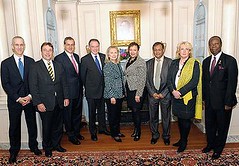 美國國務卿希拉蕊16日發起一項運動,致力減少存在週期短的溫室氣體排放。
美國國務卿希拉蕊16日發起一項運動,致力減少存在週期短的溫室氣體排放。
這項由希拉蕊代表發起的運動,共有美國、孟加拉、加拿大、迦納、墨西哥、挪威等6個國家響應,她形容這是一個「目標明確、務實而積極的全球性運動,目標在減少世界各地短週期的溫室氣體排放。」
這項運動鎖定的三種溫室氣體,對全球暖化的貢獻度超過1/3以上,分別是黑碳(或稱煤煙)、甲烷與氫氟碳化物(HFCs,普遍用於空調、冰箱、溶劑、發泡劑及氣霧劑的物質)。
這些氣體釋出後,會停留空氣中數日至數年之前;相較之下和,大氣中最普遍的溫室氣體二氧化碳,存在時間長達大約100年。
這6個國家正和聯合國環境規劃署合作,這也是全球首次,為了解決短周期溫室氣體問題的跨國合作運動。
這項跨國任務並不是要取代全球致力減少二氧化碳排放的任務,反倒是讓解決溫室氣體排放量這個問題更加完善。
希拉蕊說,「這項聯合行動會善用資源、凝聚政治力、協助其他國家進行、屢行各個任務、喚醒社會注意、並將行動理念推向其他國家、公司、非政府組織和基金會,期望一同來響應減少溫室氣體這一運動。」
目前,這6個國家已募集1500萬美元來支持這項行動。
Secretary of State Hillary Rodham Clinton Thursday announced a new global initiative to reduce short-lived climate pollutants.
Working together as the Climate and Clean Air Coalition, Bangladesh, Canada, Ghana, Mexico, Sweden, and the United States will conduct what Secretary Clinton described as "a targeted, practical, and highly energetic global campaign to spread solutions to the short-lived pollutants worldwide."
The initiative targets three pollutants that together account for more than one-third of current global warming - black carbon, or soot; methane; and hydrofluorocarbons, which are gases used in air conditioning, refrigeration, solvents, foam bl○owing agents and aerosols.
These pollutants remain in the atmosphere for a few days to a few years after they are emitted. By comparison, carbon dioxide, the most prevalent greenhouse gas, remains in the atmosphere for roughly 100 years.
These six countries, in collaboration with the United Nations Environment Programme, are engaging in the first international effort to treat the short-lived climate pollutants together, as a collective challenge.
The Coalition's work will augment, not replace, global action to reduce carbon dioxide in the atmosphere.
Secretary Clinton said the coalition "will mobilize resources, assemble political support, help countries develop and implement a national action plan, raise public awareness, and reach out to other countries, companies, NGOs and foundations."
The foundation partners are committing more than $15 million to get the coalition up and running.








